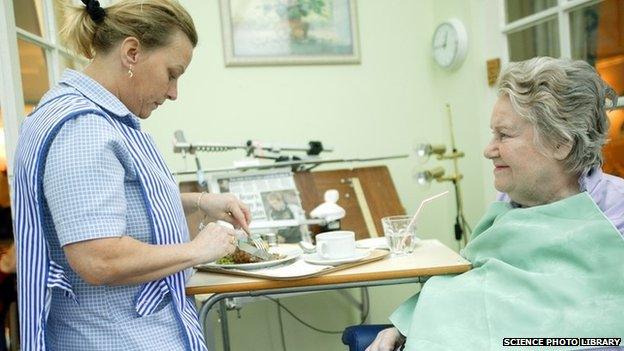Councils warn living wage costs could top £1bn by 2020
- Published

Many care workers earn less than the "living wage" at the moment
Councils in England and Wales have warned the National Living Wage could cost them an extra £1bn a year by 2020.
The Local Government Association said about 93,000 council staff currently earned less than the £7.20 an hour wage proposed by Chancellor George Osborne.
It also said social care contracts would have to be renegotiated, adding an estimated £330m to its bills.
Ministers have said a growing economy can sustain a living wage but there are warnings up to 60,000 jobs may be lost.
Under plans announced in the Budget, workers aged over 25 will be paid a minimum of £7.20 an hour from April next year, rising to £9 by 2020. The government says this will mean a direct pay rise for 2.5 million workers of an average of £5,000 by 2020.
But the LGA, which represents more than 400 councils in England and Wales, has said the cost of implementing the policy should be taken into account when council funding levels are set in future.
Although 95% of the local government workforce already earns more than £7.20 an hour, its analysis suggests there are 92,820 - mostly part-time - council employees earning less, including street cleaners, school crossing patrol workers and school dinner staff.
Increasing their pay to meet the new rate in 2016 would cost an estimated £6.8m in 2016, rising to £111m in 2020.
However, the biggest impact would be in outsourced contracts for provision of social and residential care, which councils say would have to be renegotiated to take into account the fact that many workers in the sector earn less than £7.20 an hour.
The cost involved, the LGA said, would amount to £330m in 2016, rising by an extra £170m a year by 2020.

Officials say ministers will continue to listen to council views about distributing funds fairly
"Councils support proposals to introduce a national living wage to help ensure staff receive a fair day's pay for a fair day's work," said the organisation's chairman, Gary Porter.
"However, our analysis shows the cost to councils of implementing the change will keep growing and reach £1bn by the end of the decade.
"Local authorities have made £20bn in savings since 2010 and are likely to face further funding reductions and spending pressures over the next few years. It is vital that these costs are considered by the government in the wider debate of council funding.
'Hard-working people'
"If government were to fully fund the cost of introducing the National Living Wage to council staff and care workers, councils could avoid extra financial pressure being placed on them as they continue to protect services, such as caring for the elderly, collecting bins and filling potholes."
The Department for Communities and Local Government said ministers would continue to listen to the views of councils in the run-up to the next local government settlement "about the best way of distributing funding to achieve fairness, efficiency and local growth".
"Street cleaners, school dinner staff and care workers have as much of a right to a fair wage as anybody in this country and local government employers will recognise this and the contribution made by these hard-working people in their areas," it said.
"Councils have worked hard over the past five years to deliver a better deal for local taxpayers, however, like the rest of the public sector will have to continue playing their part in tackling the deficit to ensure the economic recovery continues."
- Published1 April 2016

- Published9 July 2015

- Published8 July 2015
